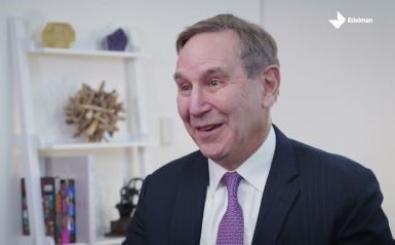Commissioner-designate for Health Stella Kyriakides: "We all have one goal, and that is One Health"
From 30 September to 8 October Commissioners-designates need to go through a parliamentary vetting process (hearings) that allows members of the European Parliament to assess the Commissioners-designate suitability for the job.In the past, these hearings led to candidates withdrawing or having their portfolios changed. The hearings are a very important moment before the European Parliament decides whether to accept or reject the entire new European Commission before it can take office. If the College of Commissioners is approved by the European Parliament, it will officially take office on 1 November 2019.
Yesterday evening, the candidate for the post as European Commissioner for Health, Stella Kyriakides, faced a three-hour public hearing in the European Parliament Committee on the Environment, Public Health and Food Safety (ENVI), the largest Committee in the new European Parliament with 76 members. Stella Kyriakides’ portfolio would include responsibilities for both policies related to health and food safety; therefore, yesterday evening she faced questions spanning from cancer prevention and care to pesticides, from antimicrobial resistance to food labelling.
At Edelman we carried out a qualitative and quantitative analysis in order to assess which were the main policy issues that Members of the ENVI Committee raised during the hearing (MEPs had the possibility to ask a total of 25 questions), as well as which were the ones that dominated the debate on Twitter. The key takeaways of our analysis can be found below:
What MEPs focused on
- Overall, Members of the ENVI Committee showed more interest for health-related topics (15 questions) rather than for food safety-related ones (10 questions).
- However, in terms of specific policy issues, action on pesticides and endocrine disruptors – a food safety topic – was what ENVI MEPs focused on the most (6 questions). The questions on the subject came from Members from S&D, Renew Europe, the Greens and GUE, showing that these groups are going to keep pushing the Commission to reduce dependency on pesticides and enforce stricter standards and regulations.
- Cancer prevention and care was also a topic that MEPs prioritized in their interventions (4 questions), asking to the Commissioner designated more details about the Europe’s Beating Cancer Plan she committed to present. The EPP group has been clearly leading this conversation, in line with their desire to activate the Commission on their proposal for a European cancer plan.
- We could also notice a clear interest in the topics of antimicrobial resistance (AMR) and medicine shortages (2 questions each), two items that have been high in the EU policy agenda in the recent past. Interestingly, when it comes to AMR it seems that there is growing consensus around the need to incentivize the development of new antibiotics.
What MEPs left out
- Perhaps one of the biggest surprises of the evening was that digitalization – a key trend when it comes to both the health and the food sectors – was almost entirely left out of the conversation: only MEP Busoi, EPP Vice-Chair for the ENVI Committee, asked to the Commissioner about her plans when it comes to support the digitalization of healthcare system. This is surprising as the President-elect of the European Commission specifically tasked Stella Kyriakides with the creation of a European Health Data Space.
- Hot button topics such as the proposal on HTA and the debate on pharmaceutical incentives (which includes orphan and paediatric medicines) were barely raised during the hearing. The same applies to pricing of medicines and vaccination.
- Similarly, when it comes to food policies, consumer information and labelling were largely absent from the debate. Also, no question on the ‘Farm to Fork’ strategy for sustainable food was raised (however, it is important to note that the topic was already addressed in written exchanges between the Commissioner-designate and the ENVI Committee).
The conversation on Twitter
- Cancer was clearly the most mentioned key word on Twitter in relation to the hearing (99 Tweets), showing that the plans proposed by the Commissioner-designate are capturing the interest of stakeholders from the health bubble and general public.
- Surprisingly, mental health was the second most talked about topic (45 Tweets), showing a clear discrepancy between the debate in the European Parliament (where mental health was mentioned only once) and the conversation on Twitter. This means that for stakeholders active on mental health more work needs to be done for the topic to be prioritized in the agenda of the new EU institutions.
- Despite dominating the debate inside the European Parliament, pesticides were only the 3rd most mentioned topic on Twitter (20 Tweets) showing that the debate is not on the of the online conversation yet. However, this might change depending on the actions that the European Commission will take moving forward.
Conclusions
When it comes to health-related policy initiatives both the European Commission and the European Parliament are aligning on a positive and proactive agenda. Indeed, ‘Europe’s Beating Cancer Plan’ and the focus on supporting the development of new antibiotics to tackle AMR represent clear policy opportunities for the stakeholders active in these areas. On the other hand, challenging topics such as price of medicines do not seem to be currently at the top of the EU agenda.
Stakeholders working on pesticides and endocrine disruptors can expect increased pressure coming from the European Parliament, where important political groups such as S&D, Renew Europe and the Greens are sharing common concerns. Should this pressure translate into legislative action, the impact on sectors involved could be considerable.
Lastly, there is a clear opportunity for stakeholders to bring forward ideas and proposals on digitalization. The Commissioner-designate showed a strong interest in the topic, while MEPs do not seem to be aware of the opportunities that digital technologies can bring to the health and the food sectors.
Next steps
- The European Parliament will vote on the full College of Commissioners during the plenary session of 22-24 October.
- If the College of Commissioners is approved by the European Parliament, it will officially take office on 1 November 2019.






